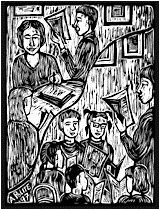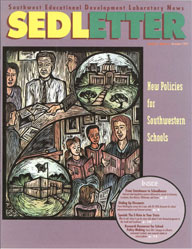From Statehouse to Schoolhouse
State Legislative Sessions in the South and Southwest Deliver Changes for Schools
In a year graced by a booming economy, the public has demonstrated a concern for education in this country, and policymakers have taken notice. Americans all interact with the educational system in some way. Students, parents, educators, taxpayers, and citizens rely on schools to help create productive members of society. The 1997 legislative sessions in Arkansas, Louisiana, New Mexico, Oklahoma, and Texas reflected that reality, and lawmakers put a great deal of time and money into education. Throughout the region, new money went to teacher and school personnel raises, technology initiatives, a combination of reading, alternative education, and accountability initiatives, and other important education issues. SEDLetter summarizes the region's key education legislation based on reports published by state agencies, news articles, state government websites, conversations with state-level education policy analysts, and the legislation itself.
The legislative branches of state government in Arkansas, Louisiana, New Mexico, Oklahoma, and Texas have posted summaries and, in some cases, the texts of bills on the Internet. Go to the source for more information about new legislation that will have an impact on primary and secondary education.
ARKANSASThe Arkansas General Assembly appropriated $1.37 billion of a $2.9 billion state budget for K-12 education in fiscal year 1998 (FY98), raising the budget 8.7 percent over 1997 funding and adding $30 million to the amount Gov. Mike Huckabee proposed. The budget bill includes another 4.5-percent increase in FY99. The legislators also tackled what one policy analyst referred to as "the continuing saga" of the education funding formula by amending the Equitable School Finance System Act of 1995 to ensure every district receives at least $4,000 per student. Here are some notable laws passed during the session. |  © 1997 A. Polite |
Teacher Salaries - School districts compliant with a new Arkansas law have already put salary schedules in place that reward experienced teachers. Provisions in Act 802 create minimum teacher salary levels with $400 incremental increases for every year of experience up to 15 years. The final step of the schedule must be implemented by the 2005-06 school year.
Curriculum - Lawmakers this session produced several laws affecting the public school curriculum, including one requiring that all K-12 students take the minimum core curriculum to the exclusion of any other tracking system. Another law guarantees local school districts will have access to information about character education programs that teachers can use in K-12 curriculum. The General Assembly charged the state department of education (SDE) with developing a clearinghouse to disseminate information on nonsectarian character and citizenship education programs in Arkansas and across the country. The General Assembly also instructed the SDE to issue guidelines to public schools for implementation of Act 787, requiring districts to add Arkansas history to the elementary and secondary curriculum by the 1997-98 school year.
Background Checks - Local districts must conduct criminal-background checks on new teachers and other school personnel under bills passed last session. Districts may pass on the costs of the searches to job applicants. The state will conduct similar background checks for current teachers who apply to extend their certification.
Technology - Intended to eliminate the "increasingly burdensome" paperwork the SDE requires of local school districts, Act 249 instructs the department to utilize "to the fullest extent possible" the Arkansas Public School Computer Network linking districts, regional service centers, and the department.
Remedial Education - Under Act 1081, Arkansas public school districts will pick up the costs of remedial summer school for K-5 pupils who did not perform at grade level during the school year. K-3 students in this category must attend summer school before they can be promoted to the next grade. K-3 students identified by teachers as not being able to read at grade level must receive intensive reading instruction during the regular school year.
Home Schools - Act 400 requires that education service cooperatives, or other designees of the SDE, pay for and administer norm-referenced achievement tests for home-schooled students. Home-schooled students who wish to receive a high school diploma from their local school district must attend at least nine months of classes at the local high school immediately prior to graduation.
LOUISIANAWell before Louisiana's legislative session began, Gov. Mike Foster proposed a budget heavily focused on education. The legislature supported the governor's policies by approving a $2.10 billion K-12 education budget for FY98, a 6-percent increase over FY97. The comprehensive education reform package includes expanded charter schools, a K-3 reading and math initiative, salary increases for school personnel, and many other significant initiatives. Officials were able to fund the raises without renewing an expired one-cent sales tax on food and utilities that Gov. Foster had predicted might be necessary to generate funds. |  © 1997 A. Polite |
School and District Accountability - Through HB 2068, some schools will be required to develop or revise improvement plans using an accountability system that Louisiana's Board of Elementary and Secondary Education (BESE) will design. District offices are expected to assist the lowest-performing schools. The system will include incentives for schools that meet achievement targets and corrective actions for those that fail to meet minimum standards. Legislators appropriated $2.2 million of $3 million placed in a fund for accountability system development and technical assistance.
Teacher Salaries - The 1997-98 school year promises between $1,000 to $1,400 in individual salary increases for teachers and other certified personnel; the raises come with two additional staff development days for teachers. Aides, bus drivers, food service workers, and other support staff members can also expect increases of about $350.
Leadership Development - Acting on the belief that "Good principals equal good schools," state government created a $1 million Leadership Development Fund for a training program for current and aspiring school administrators. Lawmakers allocated $476,000 for the program this fiscal year. The program will be implemented in stages after the SDE has developed the comprehensive plan.
Reading and Math - Along with a national effort led by President Bill Clinton, many states have instituted reading initiatives for students in kindergarten through third grade. Louisiana expects its K-3 Reading and Math Initiative, supported by $30 million in state funding, to deliver measurable and palpable improvements in student performance in language, literacy, and math.
Technology - To enhance technology usage in public and approved nonpublic schools, the Louisiana legislature created a $38.2 million Classroom-Based Technology Fund. Under HB 1911, a State Technology Advisory Committee will advise the SDE on the development and administration of technology fund grants to elementary and secondary schools.
Teacher Supplies - The legislature set aside $11.4 million for teachers to use for school supplies during the 1997-98 school year. Local school boards will receive and distribute an average of approximately $250 per teacher on a per-pupil basis.
Charter Schools - Groups wishing to start new charter schools or convert existing public schools may now apply to do so in any Louisiana school district. If the local school district does not grant the charter, school developers may appeal to the state board of education. Under revisions to the Public Charter School Program, up to 42 charter schools can now be created statewide. Lawmakers also created a $3 million charter school start-up loan fund.
 © 1997 A. Polite | NEW MEXICOUp $64.8 million from FY97, New Mexico's $1.38 billion FY98 budget for public schools covers Public School Funding Formula dollars, educational technology, educator background checks, incentives for school improvements, and a slew of other education-related expenses. Several major bills died in the legislature as a result of a filibuster (e.g., money for teacher raises) or were vetoed by Gov. Gary Johnson (e.g., a strategic plan for public education, the Family Assistance and Responsibility Act, a statewide professional development framework). Yet a few significant changes came out of New Mexico's 1997 legislative session.
|
School Funding Formula - Major alterations to New Mexico's equalization funding formula resulted in the replacement of the "density size adjustment" factor with a system of "at-risk program units," which takes into account indicators such as a district's poverty and dropout rates and bilingual population. The funding formula changes should lead to budget increases of 3 to 12 percent for most districts. Special education indices and program units for special education ancillary service programs also were revised.
Accountability - SB 997 directs the state board of education (SBE) to design state accountability reports so districts provide relevant data. The SBE must also establish accreditation levels-including sanctions and incentives-to measure school performance. The state department of education will create a method for measuring school performance based on five indices: student achievement test scores, school safety, dropout rates, attendance, and parent and community involvement.
Incentive Plan - Lawmakers amended the Incentives for School Improvement Act to provide financial incentives for schools that exceed expected academic performance. In measuring a school's academic performance, the SBE will consider such socioeconomic variables as students' mobility rate, English proficiency, school lunch program participation, and other relevant factors.
Background Checks - Educators applying for initial certification will undergo background checks paid for with $60,000 in state education funds under SB 106. Public schools must develop procedures and guidelines for performing background checks on noncertified individuals who have been offered employment.
Technology - Without having to submit bond proposals to voters, school districts can now create debts by entering into lease-purchase arrangements to acquire computers and other education technology equipment. HB 1304, funding the Education Technology Equipment Act, follows a constitutional amendment approved by voters in November 1996 that allows the lease-purchase arrangements. School districts seeking additional funding for educational technology may qualify for money from the new School Bus Advertising Fund, to be administered by the SDE.
OKLAHOMA
Oklahoma increased its $1.53 billion FY97 public education budget by 6.5 percent for FY98, for a total of $1.65 billion out of a $4.48 billion state budget. Proposed charter school and voucher legislation did not pass. The session did produce laws implementing criterion-referenced testing and a massive expansion in Medicaid for children. The following are some other significant laws crafted by Oklahoma legislators.
Teacher Salaries - Although the legislature rejected Gov. Frank Keating's proposal for annual performance awards for teachers, it obtained his signature on the teacher pay raise legislation he vetoed last year. The law rewards veteran teachers by providing a $332 per step pay raise for years 16 through 25, and teachers who earn advanced degrees will qualify for $1,100 in pay raises.
Vocational Education - Lawmakers boosted funding for vocational and technical education programs by $11.7 million, bringing the total allocation up to $107.9 million. These dollars will support business and industrial training, modernization of high school vo-tech programs, capital funding for some area vo-tech campuses, dropout recovery, and welfare-to-work programs.
School Discipline - Originating in a concern for educational reintegration of suspended students, HB 2130 mandates that principals provide an education plan for students suspended from school for more than five days for nonviolent offenses. Students suspended for committing violent offenses may not be readmitted into classrooms without teacher consent.
Testing - SB 337 codifies SDE administration of the Oklahoma Advanced Placement Incentive Program, an effort to improve course offerings for high school students and to prepare students for postsecondary education. The program offers financial assistance to teachers and schools to help them to build and maintain successful advanced placement programs, and provides test-fee assistance to students who need it.
Reading - Beginning in the 1998-99 school year, schools in Oklahoma will assess the reading proficiency of all first and second grade pupils. The Reading Sufficiency Act requests that schools then provide remedial work for students who do not demonstrate adequate reading skills. While no funds were allocated for the reading initiative, $3.3 million is now available to pay for teacher training in intensive elementary reading.
Technology - Gov. Keating's plan to connect every public high school to a state telecommunications network did not pass the legislature. New Oklahoma laws direct the SBE to create rules and funding for an Education Technology Grant Program and require that Professional Development Institutes include technology training for teachers and administrators.
TEXASEarly indications hinted that the Texas legislative session would mean either big changes for the state education system or minor adjustments to last session's massive rewrite of the Education Code. The failure of a widely publicized and heavily debated property tax reform package forestalled additional significant changes. Instead, the house and senate adopted a more modest property tax school finance plan that raises the state-mandated homestead exemption, increases state revenues for public education, and reduces local property tax rates. A notable jump in state spending on education will be offset at the district level by reductions in local tax bills. |  © 1997 A. Polite |
The FY98-99 biennial K-12 budget for Texas rises to $18.9 billion from the $17.6 billion FY96-97 budget. New money was allocated for increased teacher salaries, facility construction, enrollment growth, and contributions to the state teacher retirement fund.
Teacher Salaries - Under SB 280, school districts will credit teachers and librarians for every year of experience and place them on a state minimum salary schedule. The state set aside $255.7 million to bring all Texas teachers to minimum salary levels.
Performance Incentives - Following statutory provisions in SB 168, school-level planning and decision-making committees will determine how performance incentive awards given to principals should be distributed on school campuses. Awards of $2,500 to $5,000 go to the schools of "high-performing" principals identified through the Public Education Information Management System and Texas's public school accountability system.
Charter Schools - Gov. George Bush signed a bill authorizing the creation of up to 100 new open-enrollment charter schools in Texas as well as an unlimited number of charter schools to serve students who are school dropouts or at risk of dropping out. HB 318 expands the Public Education Grant program, allowing almost 800,000 students at 1,150 low-performing campuses to transfer to better public schools.
Alternative Education - Unruly students face tough consequences under SB 133, regulating alternative education. Students removed from the classroom for disruptive behavior or illegal activity must be placed in a juvenile justice alternative education program (JJAEP) wherever possible. Expelled students in school districts that do not participate in a JJAEP are exempt from compulsory school attendance requirements. The legislation also sets out placement and procedural guidelines for alternative education programs, including qualifying student offenses.
Reading - Courtesy of HB 107, the Texas Department of Transportation will sell special "Read to Succeed" license plates to help pay the administration costs of new reading diagnosis programs for K-2 pupils. School districts must implement reading diagnosis programs by the 1998-99 school year.
What of the Future?
Many of the policies crafted in the 1997 legislative sessions touch upon education's most persistent and controversial questions: Where will money for schools come from, and who gets how much? Who is accountable for the failures and successes of public education? What should our children be learning?
Lawmakers are likely to continue to face these enduring questions during their next full sessions in early 1998 in Oklahoma and early 1999 in Arkansas, Louisiana, New Mexico, and Texas. In the meantime, national welfare reform and other federal mandates already show signs of shaping the state education legislation of the future. And ongoing public debate about charter schools, voucher plans, and similar school choice measures will probably influence lawmakers when they reconvene.
 © 1997 A. Polite | From Statehouse |  |
Visit these websites to learn more about the new laws that are affecting public schools in the South and Southwest.
- The Arkansas General Assembly has posted an excellent overview of the legislature's actions during the 1997 session, including a summary of actions on general legislation that calls out actions relevant to K-12 Education.
- To read the texts of education bills passed by the Louisiana House of Representatives, follow links from the Major Issues Addressed during the '97 Session from the LA House 1997 Session/Bill Information at the Louisiana State Legislature website.
- The Bill Finder at the New Mexico Legislature website will allow you to search for education-related bills; however, the site lacks any summaries of bills.
- A session overview of the Oklahoma House of Representatives offers thumbnail summaries of important legislation and allocations for education to those who scroll patiently down the page to the Education entry. More detailed information is readily accessible under the House of Representative's Education Highlights page.
- The Texas House of Representatives posts a summary of major issues lawmakers faced during the regular 1997 session, including budgets and bills. Further information is available at Texas Legislature On-line. - Mimi Mayer and Julia Guzman.
SEDL Policy Associate Julia Guzman works closely with policy analysts and follows education issues in Arkansas, Louisiana, New Mexico, Oklahoma, and Texas.
Next Article: More Money for Schools, Less Consensus on Allocations

